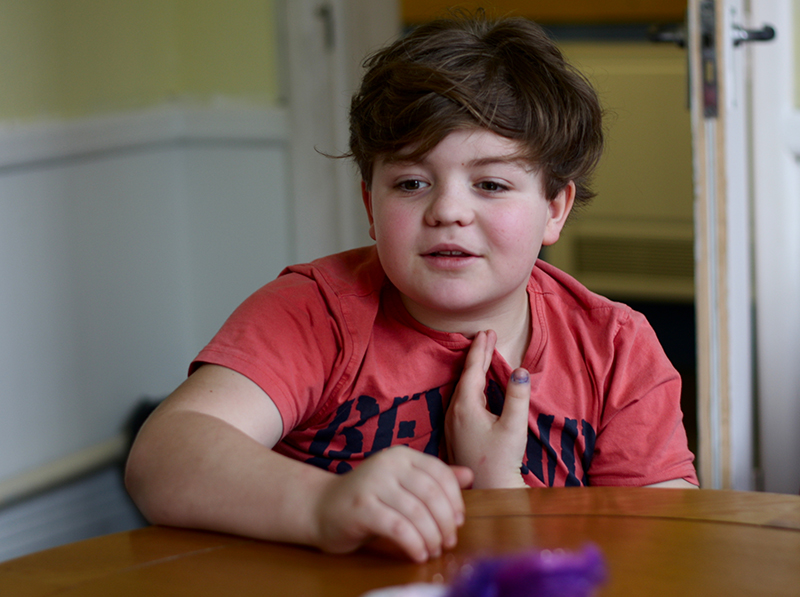According to surveys commissioned by the NHS, roughly one in eight 5-19 year olds in the UK have a diagnosable mental disorder. Twenty years ago the figure was one in ten. Emotional disorders, such as anxiety and depression were the most prevalent type of disorder, as well as being the one with the biggest increase in cases.1 Though causes of mental illness are almost always complex and multi-faceted, and I am aware that determining all the causes for these figures is beyond the scope of this article, surely it is worthy of note that with increased focus on academic achievement, more homework and less free time, children are struggling more and more to cope with the pressures of day to day life.
While mental disorders range extensively in type and intensity, it is important to remember that the term “mental disorder” as used in the survey means that someone is struggling in a way that impacts their day to day life. This includes the girl who is afraid to go to school because she has been bullied so badly; the boy that has been labelled a “troublemaker” because he is unable to sit still for prolonged periods of time; the child that struggles with sensory overload and cannot concentrate in a class of thirty; the girl with an eating disorder; the boy who is so scared of failing his exams he is unable to sleep at night. 1 in 8 may seem high, though in all honesty, considering the challenges and pressures facing young people today, I can’t help but wonder if the figures are a little low.
Schools, colleges and universities across the UK have attempted a number of programs and policies to try to combat the epidemic of mental illness. Anti-bullying policies, PSE lessons, pastoral care, counselling and talks and workshops from mental health specialists are no doubt all positive things that go towards helping to address the issues surrounding mental illness, but do they go far enough?
The cost of mental illness on the British economy has been estimated at a staggering £100 billion per year, with 75% of mental health problems being already established by the age of 18.2 By contrast public expenditure on education in the UK is roughly £90 billion3. While it is important to remember that the greatest cost of mental illness is not financial, these figures give an idea of the enormity of the problem, and indicate how mental illness permeates every area of society. When the consequences of mental disorders cost more than is spent on educating young people to contribute to society should we not be questioning the effectiveness of the educational system?
So what can educational establishments do to change this picture? How can we help children to grow up happier and more confident so that they are not leaving school at 18 with established mental health conditions that will stay with them for life? In my view this calls for a radical shift in our attitudes towards children and education, not more intervention strategies that barely scratch the surface of the real problem.
I can’t help but think that if schools taught self-advocacy instead of blind obedience, responsibility rather than dependence and really listened to children instead of expecting them to be quiet and passive all day, perhaps we would not be in the position that we are as a society. There would be more entrepreneurship, more involvement in local communities and people living much happier, more productive lives. As a parent I would far rather raise happy, confident children, regardless of how they might make their way in the world, than adults with high flying careers and lifelong anxiety issues rooted in the attitudes that they were immersed in growing up.
At East Kent Sudbury the main focus really is on what is best for each individual child. The core values at EKS are freedom, equality, trust, responsibility and democracy, beginning with the belief that children should be given the same rights that we would expect as adults. Everyone is an equal member of the community, students are free to organise their own time and follow their passions, everyone has an equal say in the running of the community, and all conflicts are resolved by a panel of peers, whilst preserving the dignity and respect of both parties involved.

The most important event in a typical day at EKS is the Judicial Committee (JC). Any time a rule is broken or a boundary violated by a member of the community, students and staff have the right to make a complaint to be reviewed by the JC. Every day at 11 o’clock sharp a panel of staff and students will examine all complaints written by staff and students on the proceeding day. The panel will hear both sides of the story and establish what happened and whether any consequences need to be implemented. The purpose is not to punish students. It is to hold the community members accountable for their actions in line with the laws decided by the community. Thus respect and personal responsibility are upheld, and distress and embarrassment are largely avoided. To me, this seems a much better system for dealing with complaints than one in which the teacher’s word is law, and problems as serious as repeated assault and verbal and psychological abuse are treated as seriously or flippantly as the whim of the adult authority might dictate.

Furthermore, at EKS autonomy really does mean autonomy. Students are given complete freedom over their own learning (within the bounds of the laws created by the community and safeguarding procedures). If a child is unable to sit still for an hour they don’t have to, and they will never be labelled as “naughty” or “disruptive” for running around or wriggling to their heart’s content. There are no forced exams for students to feel anxious about and bullying is not tolerated because the rules are made and enforced by the community as a whole, not by teachers or supervising staff. Everyone is a contributor and everyone is accountable for keeping the system running. If a new law is needed, or an old law is deemed unnecessary, any member may propose to make changes to the law book, and every proposal, no matter what it is, will be discussed and decided on by the community. Thus students grow up knowing that their feelings and opinions matter and that they are able to have a real and significant impact on the world around them.
When I was considering options for my children’s education it was the unique dedication of EKS to the dignity and respect of children that clenched my decision. I haven’t looked back since.

This really resonates with me. I’m a trained teacher now home educating my children (sadly too far from Kent to be involved in what sounds like an amazing school!). My main reason for home educating was exactly what you have outlined here: the mental health crisis in young people. My experience in the classroom taught me so much about education – namely that I didn’t want to do it that way! I taught science. Allowing students to discover things for themselves and experimental design were things I initially thought unnecessary (as telling them knowledge/how to do things is so much quicker!). My opinion was fundamentally altered on what it means to “educate” the more I did it and the more I saw value in allowing students to take charge of their own education. I am thrilled to hear about your school and wish you all the best in your endeavours.